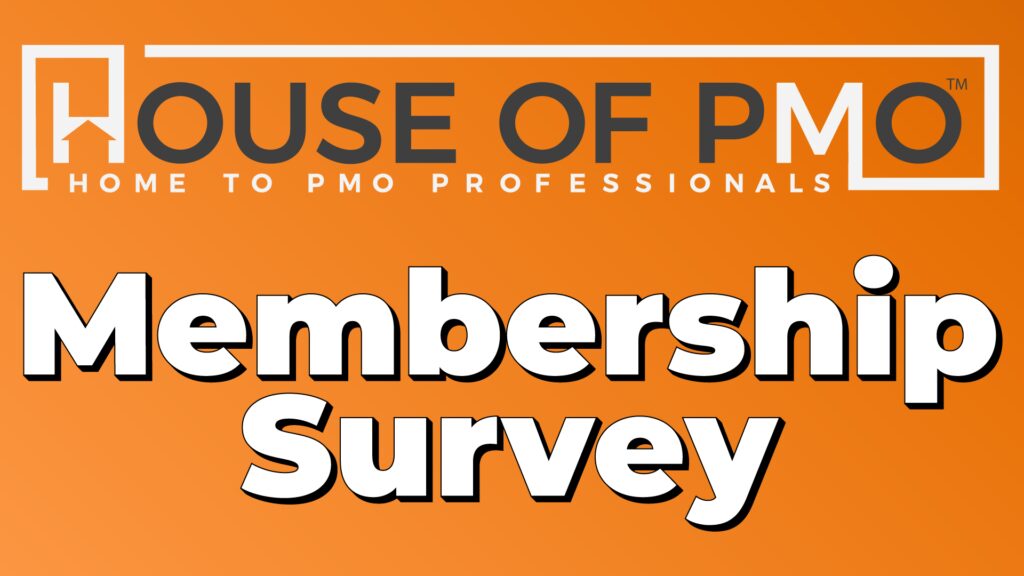You can find all our articles and past events
Free Articles | Inside PMO | PMO Conference | PMO Book Shelf
Top Ten Trends in PMO for 2019
It’s that time of year again when we take a look into the possibilities of PMO land next year. We’ve been doing these articles for a couple of years and we don’t tend to be too far out. Take last year’s for example: Here are last year’s trends (the full article can be found here):
- Agile PMO will continue to evolve and mature with a recognition that the primary areas of focus aren’t going to be easy
- Agility as an ability – the PMO makes a contribution to working in a VUCA world
- The penny continues to drop – the PMO doesn’t belong to you, it belongs to the business
- A PMO Competency Framework and Assessment… finally! And it’s created by the PMO community.
- ? PMO continues – there are more consultancies, training firms, software providers that want your business
- Steadying the ship – understanding what the basics are and doing them well
- A deeper understanding of lessons, understanding failure and really learning
- The PMO Plan – got one for tomorrow, 90 days and 12 months?
- A new Value to think about
- MARVELlous PMO people
The Agile PMO stuff got taken up a level with the release of the Inside PMO Report and the subsequent one day course from sister company PMO Learning; still lots of conversations about understanding what the business needs from the PMO and designing the PMO to deliver against that; the Competency Framework is not quite there yet so that’ll be a goal for 2019; concentrating on designing and delivering services – doing the basics and doing them well – still features in a lot of PMO conversations at Flashmobs, conference and in the training rooms.
We’re still making sense of the changes our businesses are making through VUCA times and how the PMO adapts and changes with it – and throughout 2019 we reckon there will still be periods of disruption that unsettles the modus operandi of the PMO.
So what will 2019 bring? We’ve pulled together our top ten based on all the knowledge being shared from PMO conferences; PMO Flashmobs, webinars, blogger comment; virtual meetups and little pockets of conversation here and there. Here’s what we have:
- Project data analytics really cannot be ignored and 2019 is the year where we start to learn what it is all about and how the PMO can utilise it.
- Making the case for automation – machine learning, AI and robotic process automation need to be understood before the PMO works out how to embrace it.
- More coaching skills needed – Agile has driven the need, facilitation and using coaching approaches helps PMO practitioners to beef up their behavioural skills.
- PMO Competency Framework and Assessments will be talked about a lot!
- Storytelling and the visualisation of data – learning analytics paves the way for improving the articulation of insights.
- Creating PMO principles for your PMO – using them to navigate unchartered waters and providing a strong ethical and moral foundation.
- Digital PMO – ready to work in a digital environment and applying digital ways of working to the PMO itself. Embracing a multitude of delivery approaches.
- Metrics and measures for the PMO – understanding how the PMO knows it has been successful and delivering what the business needs.
- Pastoral care to meet the personal, social (wellbeing) and development needs of PMO staff and the wider organisation.
- Utilising PMO skills but not in a PMO role – new positions continue being created without the PMO label.
Let’s take a look at those and find out more about them:
One: Project data analytics really cannot be ignored and 2019 is the year where we start to learn what it is all about and how the PMO can utilise it.
If you’re anything like me you’ll be fascinated by all the talk about project data analytics and what can be achieved with data science. You’re probably feeling slightly overwhelmed with it all too – data models; analysis, visualisation – gosh where to start?! 2019 is about starting that journey to understanding, dabbling, even a bit more than that if your organisation is already on that road.
Working in PMO means you can’t ignore it – you need to understand what it’s all about and the potential for your PMO and the wider organisation.
A good place to start is getting out and about and listening to the project data analytics community – take a look at the one which has gone strength to strength in London. If you’re looking for something to read take a look at the paper published in the PM Journal back in October 2018. If you’re looking for some crash course type help, head over to Coursera and start with this one.
Two: Making the case for automation – machine learning, AI and robotic process automation need to be understood before the PMO works out how to embrace it.
Again if you’re anything like me you’ve probably put the AI stuff to one side and thought what on earth have robots got to do with PMOs?!
Chatting to various people over the past year I’ve been surprised just how many people are already utilising this type of technology – the robotic process automation (RPA) stuff sounds amazing at getting rid of repetitive tasks which are still carried out on a daily, weekly and monthly basis in a PMO. We’ve tinkered with UiPath and then realised that actually, this is an entirely new type of skillset and one that falls into one of our predictions from 2016 about hiring data analysts into the PMO. Or maybe it’s about upskilling those already in the PMO who have a passion for data?
2019 is about exploring what automation can mean for your PMO – and to the wider delivery organisation – really understanding what this stuff is about when we take the sci-fi out. Once we start to understand, the PMO can be in a position to advise, be ahead of the curve for a change rather than lagging behind, making recommendations for what can work for the organisation’s own project context.
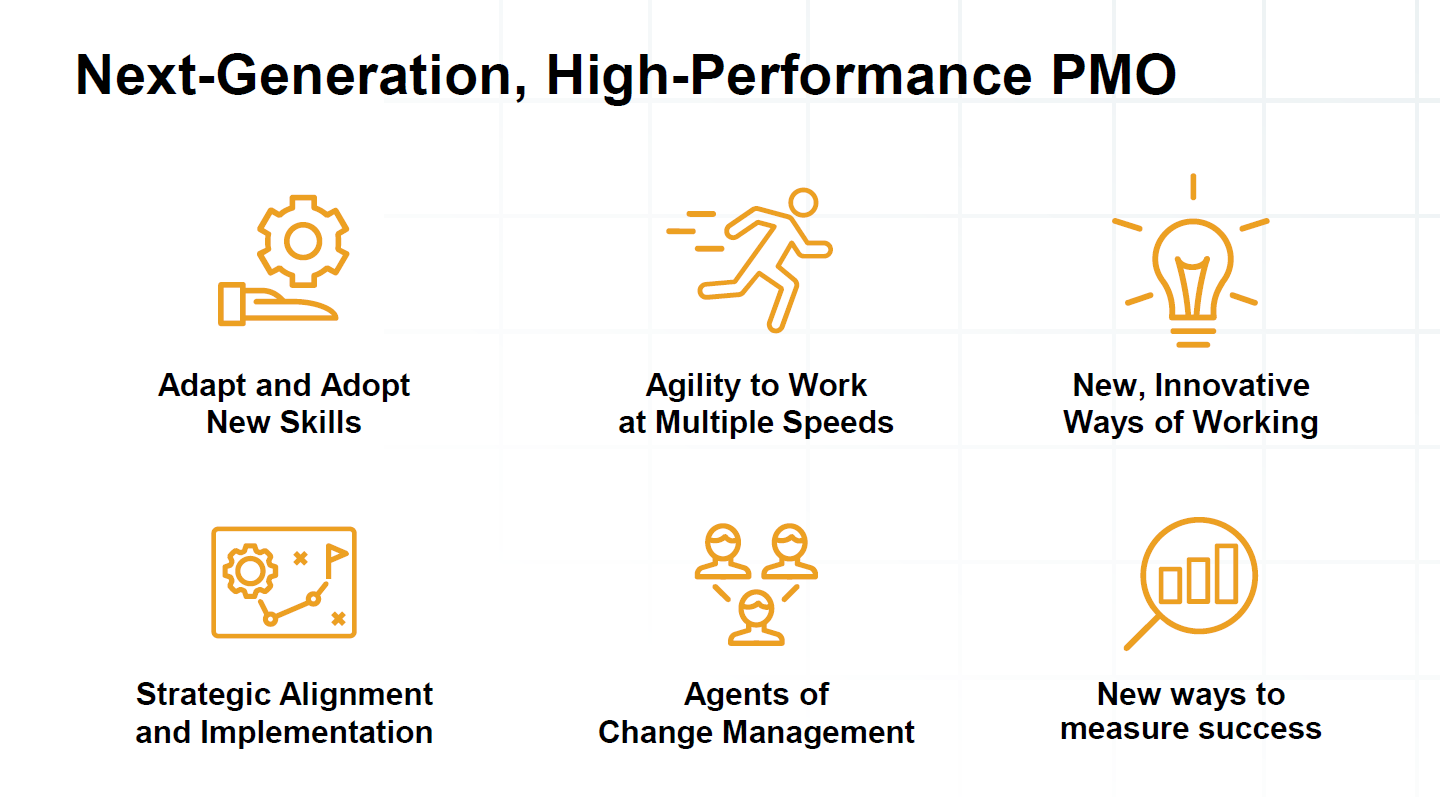
The C-Suite Outlook: How Disruptive Technologies Are Redefining the Role of Project Management (2018) PMI
Three: More coaching skills needed – Agile has driven the need, facilitation and using coaching approaches helps PMO practitioners to beef up their behavioural skills.
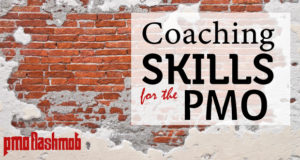 One of the most frequently asked questions in the Lean-Agile PMO course is about the Agile Coach. What is it that this person does and can the PMO learn from them too? Whilst the PMO has been getting to grips with the different types of delivery approaches available – Agile being one of them – coaching has popped up as a ‘thing’ the PMO could be doing more of to support delivery teams.
One of the most frequently asked questions in the Lean-Agile PMO course is about the Agile Coach. What is it that this person does and can the PMO learn from them too? Whilst the PMO has been getting to grips with the different types of delivery approaches available – Agile being one of them – coaching has popped up as a ‘thing’ the PMO could be doing more of to support delivery teams.Go back a few years and the sessions at PMO Flashmob were about being a coach – to the point of being qualified as a coach. Things have changed now – the PMO is better placed to adopt coaching practices rather than becoming a qualified coach – it’s an overkill for what is actually needed within the business (although some PMO practitioners have still opted for formal coaching courses) There’s a stepped approach needed to upskill PMO staff and it starts with facilitation. Facilitation approaches help the PMO to start working with teams in a closer, more practical way. By learning facilitation approaches, methods and tools we can start to understand more about how people tick and have practical ways to help us deal with different situations.
The coaching side is the next step – again focusing on what coaches do, what approaches do they use, what tools do they have at their disposal? When we can use models and frameworks that are proven, it gives us the confidence to try to help others by deploying them. At a recent PMO Flashmob we started getting into coaching and understanding what we can start doing today. [Take a look]
You can also take a look at this article too to get a better flavour.
Four: PMO Competency Framework and Assessments will be talked about alot!
The PMO Competency Framework project we kicked off in 2017 is still ongoing! Why is it taking so long? Well over the course of the last 16 months or so our thinking has continued to evolve and change. We want to make sure the end product is fit for purpose and of course its important for us to do this project with the community too.
We knew it would be a long road – that’s probably why one doesn’t exist already because its hard work!
Anyhow, it’s on the trends list for 2019 because it WILL be finished this year – it’ll be available to all of you and I know it’ll generate lots of conversations and discussions.
2019 is just the start for putting a spotlight on the capabilities of PMO people.
Five: Storytelling and the visualisation of data – learning the analytics paves the way for improving the articulation of insights.
We featured data storytelling at the PMO Conference 2018 because data and information is such a large part of the PMO role. We wanted to see what’s possible with storytelling in a business setting, about how you can inform and compel people to listen and take action.
It’s a way to bring alive data and information and make what we do more human. The PMO is there to help people make decisions – presenting the data is not enough (that much we have learnt!) and with data storytelling it’s a brilliant way for the PMO to show that they really understand the data they’re managing and analysing. The visualisation of data is also a big part of that – if we know what story the data is telling us, we can have a little fun with the way we present that to others. I think infographics and the ilk will be our best friends. Time to get creative?
Six: Creating PMO principles for your PMO – using them to navigate unchartered waters and providing a strong ethical and moral foundation.
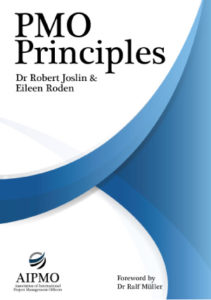 Just over a year on from the publication of the PMO Principles and it’s been brilliant to see how people have embraced them. The seven principles have started discussion and debate, led PMO leaders and their staff members to look at their own PMO just that little bit closer. They’ve created their own principles, pinned them up on the wall and generally try to live by them.
Just over a year on from the publication of the PMO Principles and it’s been brilliant to see how people have embraced them. The seven principles have started discussion and debate, led PMO leaders and their staff members to look at their own PMO just that little bit closer. They’ve created their own principles, pinned them up on the wall and generally try to live by them.The whole idea of ‘principles’ was initially one of those woolly concepts I didn’t get – then it was explained to me as simply as… ‘when you’re not sure what path to take or what action to carry out because it’s not been done before, principles help guide you to take the right next steps…’
The PMO will continue to face many unchartered waters as their businesses change and evolve. The team will be pulled in many directions, sometimes up against it or sometimes in positions of opportunities, knowing when to take them or swerve them. Your own principles not only help the PMO to navigate those but also show the business that the guiding principles will help in making the right choices and taking the right direction.
What are your PMO principles?
Seven: Digital PMO – ready to work in a digital environment and applying digital ways of working to the PMO itself. Embracing a multitude of delivery approaches.
Digital PMO was another PMO Conference 2018 first and does it differ from Agile PMO was the first question. I think it does – it’s about the PMO working specifically in highly digital environments where cutting edge technology is being used in projects as part of the solution.
It’s about the PMO being fit, nimble and flexible when working projects which are delivered at pace. It almost doesn’t matter which delivery approach is being used – just accepting that there will be a myriad of them and working out how to apply just enough governance and control.
The Digital PMO is also about taking some of the approaches adopted by delivery teams in their work and applying them to the business of running PMO.
The PMO should be able to adapt and flex in how it rolls out a new service for example; ensure service readiness; be consicious of minimum viable products (dashboards, reports?).
In the session at the conference, Ralf Finchett talked about three specific areas: culture – visibility- strategy which the PMO can focus on and change for the better.
With culture its about the ways of working (WoW); the behaviours the PMO should be adopting and how the PMO is designed. With strategy its about focusing on sequencing projects in the portfolio; focusing on planning and risk (the fundamentals) and funding and outcomes (as opposed to the old language of benefits management). With visibility it’s all about transparency and trust and working with people on their level and their view of the world.
The PMO should not be just about embracing the chaos, they should be accepting it and getting on with making things work.
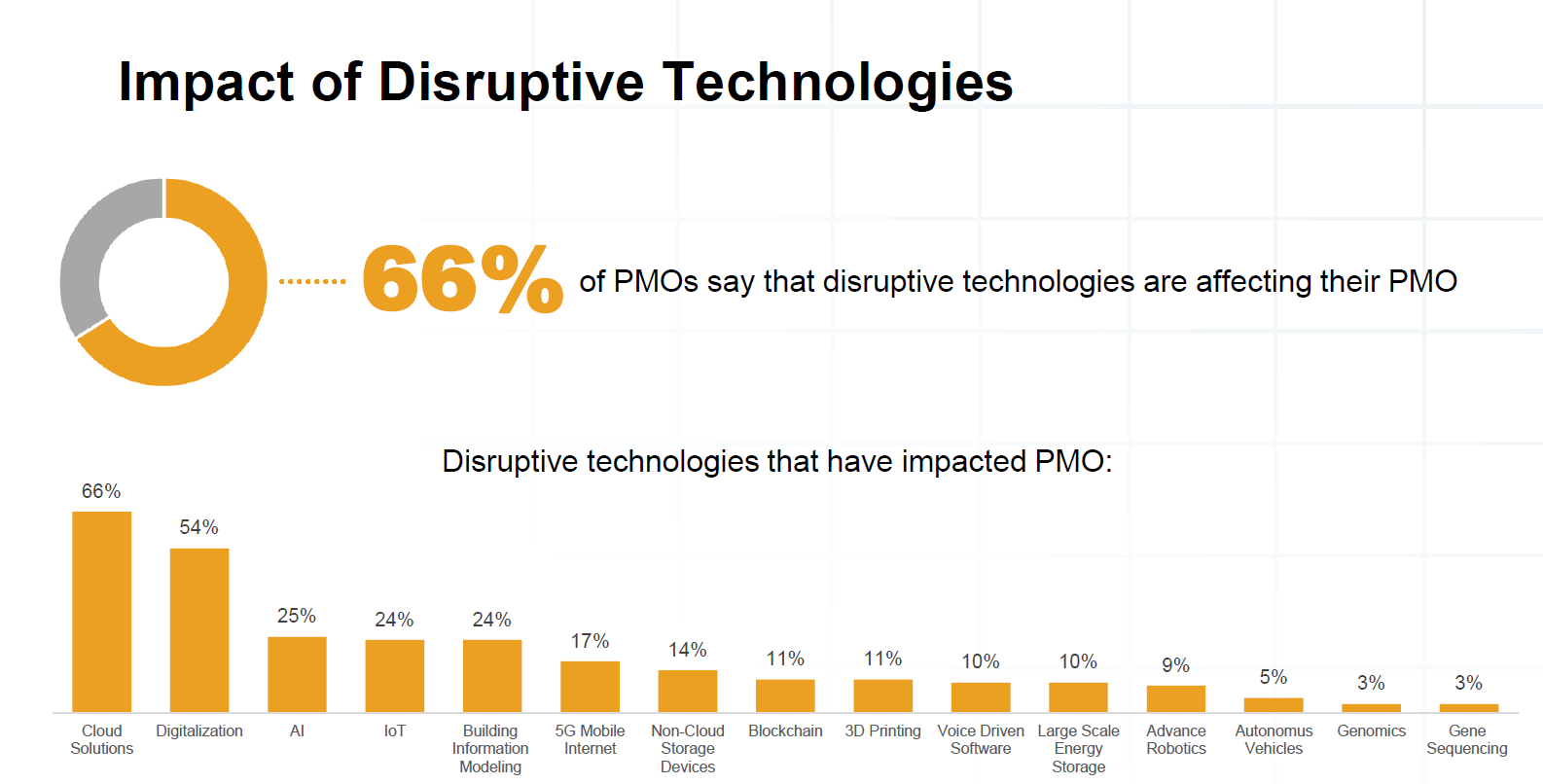 Eight: Metrics and measures for the PMO – understanding how the PMO knows it has been successful and delivering what the business needs.
Eight: Metrics and measures for the PMO – understanding how the PMO knows it has been successful and delivering what the business needs.Metrics and measures was the theme for the latest PMO Managers Lunch in November 2018 with the report being ready in February 2019. It’s a subject that both fascinates and exasperates in equal measures.
Why should the PMO have metrics and measures that show how successful (or not) they are? The HR department doesn’t, the Finance department doesn’t – why should the PMO?
That’s one side of the PMO metric coin – the other side is, the business wants to know if this ‘overhead’ department is pulling its own weight.
In 2019 we want the conversation to change and a different way of thinking to materialise and get out of this rut in which we find ourselves. Watch out for the report where we’ll be kicking off this change.
Nine: Pastoral care to meet the personal, social (wellbeing) and development needs of PMO staff and the wider organisation.
Pastoral care is not something we widely talk about or acknowledge the PMO has a part to play. Of course there is pastoral care of the people who work within the PMO (and of course lead/manage it too) and we’ve found that conversations over the year show that this part of the role is not taking as seriously as it should. Some PMO practitioners struggle from time to time for various reasons and with a little more pastoral care – not only from direct managers but colleagues too – things can be helped or smoothed.
There is the health and wellbeing of people at work – and the PMO is ideally placed in the middle of a delivery organisation to see and sense the health and wellbeing of the teams and managers they support – yet how many of us feel comfortable and qualified to help when it becomes obvious our colleagues may need pastoral care. The PMO experiences the norms of a project team working well and can easily pick up on the changes being driven by stressful and unpredictable factors.
The PMO’s main remit is to support – the question is, is the PMO able to provide a pastoral care type of support when needed? Or at least highlight it in confidence?
Away from health issues, the PMO is also in a prime spot to support development needs of the people in the delivery organisation – yet do many PMOs take on this role? It’s been a part of many PMO Flashmob conversations over the year – does the PMO provide training in specific-organisation or project areas itself? Does it provide 1-2-1 development? Can it spot skills deficiencies and help remedy it?
Ten: Utilising PMO skills but not in a PMO role – new positions continue being created without the PMO label.
This trend was mentioned to me (thanks Chris) and until I saw a few examples I was unclear about what this meant. Then I thought about it a bit more and actually realised it’s a lot more common than I thought.
There are people who are utilising the skillsets of PMO practitioners who are not working in a PMO or even a project based role. They’re doing work like assisting with business planning and forecasting; they’re working alongside department heads and providing the operational insights through data and information means. They’re chairing senior executive meetings – and yes taking the minutes! They’re managing small scale projects like office relocations alongside the day job of managing business analytics; understanding department skills capabilities, hiring and firing.
These people are often working in a senior role – some getting involved in strategy formulation and management. Others are the department contact for change being delivered for the department – the face to the project management department. It’s an hybrid role of operations and change – and one which comes with using what we would recognise as PMO skills.
Maybe we’ll be poaching these people to join the PMO?
It’s an interesting career that has popped up for some people – and I wonder if we’ll see PMO practitioners carving out roles in the operations part of the business and leaving project management behind? Nah, I doubt it, but portfolio management does incorporate more of the BAU alongside change activity so perhaps PMO practitioners will see different opportunities materialising there.
Those are our top PMO trends for 2019 – what do you think? Agreed with some of them? What’s missing? Leave a comment below and share your thoughts with the rest of the PMO Flashmob community.

